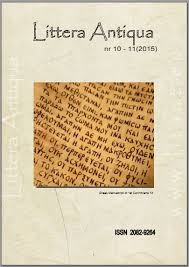Pindar of Thebes: The Orphic Mystagogue
Pindar of Thebes: The Orphic Mystagogue
Author(s): Dannu J. HütwohlSubject(s): Literary Texts, Cultural history, Ancient World
Published by: Katolicki Uniwersytet Lubelski Jana Pawła II - Instytut Filologii Klasycznej
Keywords: Orphism;Pindar;Eschatology;Gold Tablets;ποινή;
Summary/Abstract: Pindar’s references to the soul have long intrigued scholars studying the Orphic movement. The fragments of Pindar’s Threnoi attest to specific knowledge of Orphic doctrine concerning the divinity and immortality of the soul (e.g. Thren. 7 Race), while his Odes demonstrate familiarity with Orphic beliefs (Lloyd-Jones 101). In Olympian 2 and the Threnoi, Pindar describes a marked division of souls by designating separate destinations for the bad, the good, and the heroic souls. This tripartite division is also depicted in the so-called Orphic Gold Tablets, whose descriptions were possibly based on an archetypal Katabasis poem known to Orphic initiates (West 12; Riedweg 247). Nemean 6 suggests Pindar embraced the distinctive Orphic belief about a common origin for gods and men, while Isthmian 6 and the Gold Tablets both depict the waters of Mnemosyne as imparting a form of immortality upon the crowned hero-initiate (Obbink 308). Furthermore, the “secret” doctrinal Orphic myth of Zagreus, where the Titans kill Dionysus (Burkert 298), appears to be familiar to Pindar in fragment 133 Race (Bernabé and Jimenéz San Cristóbal 106); even the skeptic Linforth confesses that the Zagreus story was known to the ancients (350), and West points out (110 n. 82) that Pindar imbues the god Chronos "Time" with Orphic cosmological resonance when he calls him "the father of all" (Olym. 2.17). This paper hypothesize that Pindar was an Orphic initiate, and therefore had access to Orphic arcana such as the “Protogonos Theogony” postulated by West (260) and even the Orphic Katabasis poem. As an initiate, Pindar was privy to Orphic arcana such as the myth of Zagreus. Moreover, Pindar intentionally used Olympian 2 as a poetic platform to bridge traditional Homeric religion with the emerging Orphic mysticism, so that, as Rohde suggests, Pindar’s “views of the nature, origin, and destiny of the soul seem to be combined in his mind with equal claim to authority” (414). Accordingly, I interpret Olympian 2 as an Orphic triumph that elevates the Homeric heroes to Orphic souls by re-mythologizing the Isles of the Blessed into a common meeting place for both Orphic and Homeric souls. My exegesis will assemble Pindar’s fragments concerning transmigration and the immortality of the soul (fr. 133, 137 Race), as well as the Odes which allude to Orphic beliefs (Olym. 2, 6; Nem. 6; Isth. 6), and compare them with the Orphic Gold Tablets to argue that Pindar was working in a similar literary tradition as the composers of the Tablets and thus likely to have been an initiate. I will demonstrate that Pindar was not only composing Orphic-themed poetry for a specific audience, as was argued by Guthrie (236), but was disseminating Orphic arcana in the veiled tradition of the Mysteries more broadly, as the fact that his references to Orphic beliefs are widespread throughout his poetry (and not merely in his odes for Theron) suggests. I conclude that the celebrated poet Pindar was a μύστης who had a hard time keeping his mouth shut.
Journal: Littera Antiqua
- Issue Year: 2015
- Issue No: 10
- Page Range: 242-260
- Page Count: 19
- Language: English

